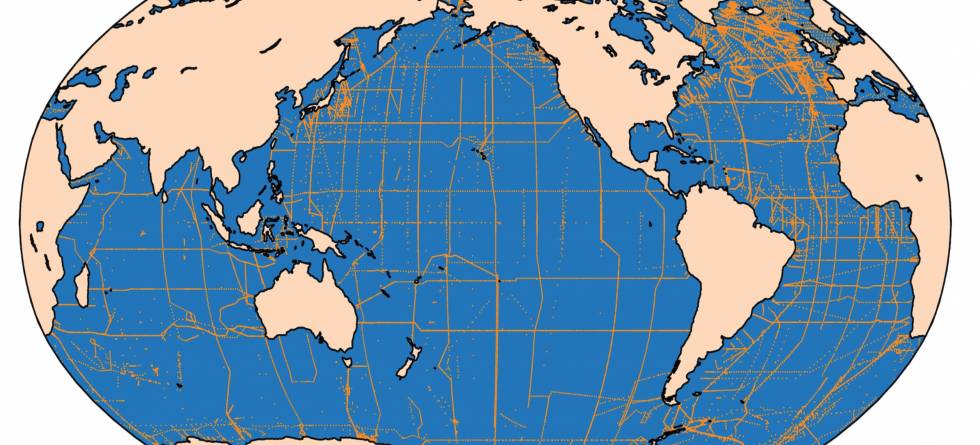Press release by Carbon Dioxide Information Analysis Center:
It is our pleasure to announce the release of a new interior ocean carbon relevant data product: GLobal Ocean Data Analysis Project version 2, GLODAPv2!
GLODAPv2 is available at http://cdiac.ornl.gov/oceans/GLODAPv2/

This version is a major update of the original GLODAP (2004). Data from 724 cruises are included, covering 1972 to 2013. GLODAPv2 includes all data from the original GLODAP, data from CARINA and PACIFICA, and data from 168 new cruises. All data have been evaluated for measurement bias and adjusted appropriately. The end result is the most comprehensive and rigorously quality controlled ocean interior data product for marine biogeochemistry studies.
GLODAPv2 consist of three elements:
-
(i) a data base with original cruise data, as submitted by individual data providers but updated to WOCE Exchange format,
-
(ii) a merged data product, with measurement biases removed for key biogeochemical variables, and
-
(iii) a mapped climatology of (ii) consisting of global 3D fields of the seawater distribution of CO2 chemistry and other parameters.
Analysis of GLODAPv2 will allow for quantitative assessment of biogeochemical changes and feedbacks between climate change and the ocean. GLODAPv2 is the result of a multi-year global team effort funded by EU-IP CARBOCHANGE, US NASA, the SCOR-IOC International Ocean Carbon Coordination Project (IOCCP) and many other projects, programs and organizations.
---
At the Bjerknes Centre Are Olsen, Siv Lauvset and Emil Jeansson have contributed to GLODAPv2. Are Olsen, associate professor at University of Bergen and Bjerknes Centre for Climate Research, has been coordinating the GLODAPv2 effort.
"The data that are included in GLODAPv2 constitute a unique resource for researchers worldwide, they will allow us to estimate ocean uptake of CO2, changes in oxygen content and ocean acidification. GLODAPv2 will also be used to evaluate the performance of global climate models for the next report from IPCC', Olsen says.
The procedures and results are extensively documented in:
- Olsen, A., R. M. Key, S. van Heuven, S. K. Lauvset, A. Velo, X. Lin, C. Schirnick, A. Kozyr, T. Tanhua, M. Hoppema, S. Jutterström, R. Steinfeldt, E. Jeansson, M. Ishii, F. F. Pérez & T. Suzuki. 2015. An internally consistent data product for the world ocean: the Global Ocean Data Analysis Project, version 2, Earth System Science Data Discussions, doi:10.5194/essd-2015-42, in review, 2016
- Lauvset, S. K, R. M. Key, A. Olsen S. van Heuven, A. Velo, X. Lin, C. Schirnick, A. Kozyr, T. Tanhua, M. Hoppema, S. Jutterström, R. Steinfeldt, E. Jeansson, M. Ishii, F. F. Pérez, T. Suzuki & S. Watelet. 2015. A new global interior ocean mapped climatology, the 1°x1° GLODAP version 2, Earth System Science Data Discussions, doi:10.5194/essd-2015-43, in review, 2016.
- Key, R.M., A. Olsen, S. van Heuven, S. K. Lauvset, A. Velo, X. Lin, C. Schirnick, A. Kozyr, T. Tanhua, M. Hoppema, S. Jutterström, R. Steinfeldt, E. Jeansson, M. Ishii, F. F. Perez, T. Suzuki. 2015. Global Ocean Data Analysis Project, Version 2 (GLODAPv2). ORNL/CDIAC-162, NDP-093. Carbon Dioxide Information Analysis Center, Oak Ridge National Laboratory, US Department of Energy, Oak Ridge, Tennessee. doi: 10.3334/CDIAC/OTG.NDP093_GLODAPv2.

